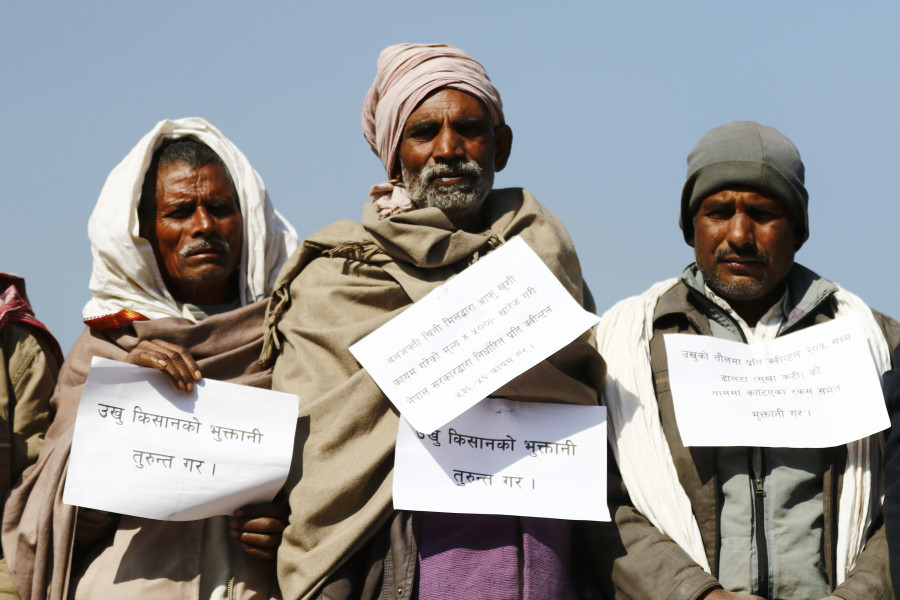Editorial
Stop the sugar scam
For years, the sugar cartel has been duping everyone–from the poor farmers to the country’s prime minister.
In a case of good governance being compromised due to local-level corruption, sugarcane farmers from Sarlahi, hundreds of them, have been forced to come to Kathmandu to ask the federal government help in relieving them of their plight. That these farmers were forced to take loans and leave their families for weeks to beats their chests in front of federal ministries shows how dire the situation has become.
These farmers have not come for handouts. They have come to demand rightful compensation that sugar mill owners have withheld—payments totalling over Rs1 billion owed to tens of thousands of hard-working farmers that kept their end of the bargain. But the government at all levels cannot claim to be misled (as Prime Minister KP Oli himself claimed once) anymore.
They must arrange for the due amount to be transferred to the farmers—many of whom are in debt. Further, they must investigate whether subsidies and price floors arranged to help such farmers have been reaching the right hands. Finally, the sugar mill owners must be brought to book; it is embarrassing that the government has allowed these unscrupulous businesspersons to dupe everyone, from the poor farmer to the country’s chief executive, year by year. Any complicity between the mill owners and local politicians too must be investigated thoroughly.
The recent case has been the flashpoint that has been coming for years. Raudi Mahato, one of the farmers, has over Rs300,000 in loans, and had to borrow another Rs5,000 just to leave his family of 12 and protest before the federal government. Annapurna Sugar Mill apparently owes Mahato Rs400,000—a sum accumulated over three years. If Mahato is not paid soon, the loan amount is bound to increase as interest racks up. Worse, he is worried that the banks will seize his land (that he put up as collateral), which Mahato relies upon to make a living.
In these past three years, when the sugar mills refused to pay Mahato and thousands like him citing a lack of business and funds, the same mills have lobbied the government multiple times. Many times they have been successful in getting the government to block cheap imports, all the while tightening supply and creating an artificial shortage. These same mills have then sold the hoarded domestic sugar at elevated prices. Consumers suffer at the price hikes of what is an essential commodity, especially during important festivals. Farmers suffer because of heavy loans and withheld payment. The government at the highest levels claim to be duped. Yet, the sugar cartel is allowed to run free and keep the scam going.
Mill owners have said in the past how they continue to lose money on sugar, Rs4 to Rs15 per kilogram, even at artificially raised prices. To these businesspersons, the following questions are put forward again: How can the industry survive for so long if it is genuinely incurring losses of this magnitude on hundreds of thousands of tonnes of sugar every year? Wouldn’t it make better business sense to shut down the mills if such losses were a reality? The farmers could then be encouraged to switch to a more profitable crop. At the same time, the mill owners must clear the past dues of all farmers—even if it has to liquidate its assets to do so.
But what is also worrying here is the failure of governance at the local level. The farmers allege that they are caught between the local officials’ and mill owners’ contradictory statements on where they can claim government-sanctioned subsidies. This needs to be cleared up at the earliest. Further, if local bureaucrats and politicians are found to purposely hoodwink the farmers at the mill owners’ behest, they must also be punished accordingly.
***
What do you think?
Dear reader, we’d like to hear from you. We regularly publish letters to the editor on contemporary issues or direct responses to something the Post has recently published. Please send your letters to [email protected] with "Letter to the Editor" in the subject line. Please include your name, location, and a contact address so one of our editors can reach out to you.




 11.12°C Kathmandu
11.12°C Kathmandu














